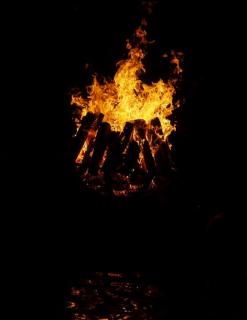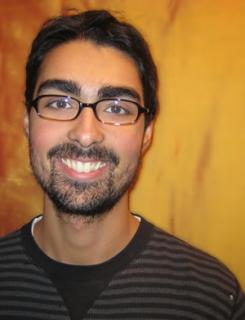Fiercely UU: Universalism and the Disinherited
By Joseph Boyd, Elizabeth Nguyen
Fiercely UU is a new blog series where Unitarian Universalist young adults tell stories about what our faith requires of us and how they follow that call. To be fiercely UU is to proclaim human worth and interdependence. In an individualist, greed-based, shame and fear fueled white supremacist patriarchy, we say no to isolation and oppression and yes to radical love and covenanted connection. Read more stories of Fiercely Unitarian Universalist Faith.
—Ed.
The Disinherited
Will is a friend of mine. We met at Rikers Island Correctional Facility in a two acre garden space, a little Eden in the midst of bars, blood, and stinky socks. Will sat in a corner and didn’t talk to anyone, just sat and stared at the wall. He looked at me one day, and I said “Hey, how’s it going?” and he looked away sheepishly. I could tell he wanted to be invisible, and it was a pin prick in his side every time someone noticed him.
Leo is a small boy I knew when I worked as a camp counselor for children whose parents are incarcerated. On a hot August day, similar to this one, Leo got in a fight with another kid in the pool, and stormed off furious toward the cabins we were staying in. He went up to one of the cabins and started punching the door as hard as he could. You could hear his little knuckles bang against the door Bang! Bang! Bang! His little hands covered with blood, his little face covered with tears.
These two beautiful souls showed me a violent, tender longing, a rage that kept their heart ablaze, their body tense, their face fierce. I knew that look. I’ve seen it many times. It’s the look of the disinherited. It’s the look of a desperate desire to connect, and not knowing how. It’s a look that is easy to turn away from, because it shows us parts of ourselves that are disinherited. To inherit something is to feel a sense of entitlement, to find yourself worthy of receiving a gift. Often an inheritance will come from family, someone who loved and cared for you, someone who knew you and said “Yes, you’re worthy of receiving a gift.” Sometimes the gift is money or property. The trickiest and most profound inheritance is approval, the stamp that says “I saw you. I know you, and I found you lovable.”
Our Universalist tradition claims something very radical. In a time of people desperate to prove their salvation, the Universalists claimed salvation was a birthright, which you could never lose, and there was nothing you could do to earn it. Simple idea, radical implications. There’s nothing you could do to get ahead, there’s no ultimate thing you could do to be disinherited from God’s love.
I spent a whole year with women and men who have internalized the shame and violence of our society, people whose mind and body were abused ferociously. Rikers Island Correctional Facility is quite a place. It’s a place where you see the shadow of our value system, a value system that places individual achievement and individual failure at a ultimate premium. Prison is a place where our failures are put, people who are judged as losers. I have to say, there is some truth to that. I did see a lot of losers: women who had lost connection with their children, sons who lost connection with their parents, people who had lost connection with themselves.
Will from Rikers Island is a poet. I know he’s a poet, because he came up to me one day and said: “Hi, my name is Will, and I’m a poet. How about you?” It was a gentle invitation to share myself, but I was at a loss of words, not sure what to say. What came out of my mouth was “I appreciate poetry.” And Will said: “Well, then you’re a poet.” The creator and appreciator are two parts of the same life. In the creation story of Genesis after God created the world, God said “it is good.” The appreciation of “it is good” is not a mere compliment, it’s part and parcel of the whole creation. Without appreciation, creation is not complete. I understood what Will meant: to appreciate is to co-create.
Dr. Cornel West famously remarks: “We are who we are, because somebody loved us.” We embody that love. We literally become it. Love rarely gets transmitted purely, it is often accompanied by pain that gets inherited from generation to generation. So we embody a kind of painful love, a love seeking healing and support. This is the kind of love I saw most clearly at Rikers… a painful love which defied expectation. People would share their stories of struggle, and in the middle of telling it, they would release a powerful laugh from the depths of their souls, sometimes just a hint of a smile which said “Who would’ve thought I’d survive that, and live to tell about it?” I saw a lot of people there who reminded me of myself, cut from the same cloth.
I have often felt like a member of the disinherited, like I never quite belonged. You can tell someone has a disinherited spirit by what they’re afraid of. Their primary fear is not death, it’s not pain, it’s not loss. The thing the disinherited are most afraid of is love and affection. I relate to this. Love can seem like an untrustworthy stranger just waiting to cheat you, and take advantage of you. We’re constantly waiting for the other shoe to drop. It is hard to let love in with all these untold stories in the way. These untold stories become like a fortress, a wall around us, reminding us just how different we are from everyone else. We’re scared to hear the stories of people in prison, people in gangs, people in hopeless poverty, because we fear the inevitable…that their stories are connected to ours, they may even be the same story, just told in a different context. In short, we’re scared we’ll see ourselves as the disinherited, challenging the facade of respectability and self sufficiency.
The only hope I have for our justice system, those directly impacted by incarceration, is we as a people get in touch with the parts of ourselves that feel disinherited. Leo is a little boy who shows me my own rage and helplessness. Will is a man who shows me my own capacity for painful isolation and poetic brilliance. These two people helped me become more myself, they’ve helped me accept more of my inheritance. They’ve showed me the power of a painful love…a love that begins as a dull ache, changes into fury, and transforms into a smile, acknowledging the grace of survival. We are called to share in that grace, that is our Unitarian Universalist faith. We still need salvation today, saved from the depths of our own private hell. Hell is not real, and neither is disinheritance. It sure can seem real though, like it’s the only real thing. We need a reminder that our soul is much deeper, much more expansive. We need a reminder that there is a space that can hold our rage and felt isolation. We need a reminder that we are more alike than we ever imagined. May we serve as a reminder of this for each other, wherever we go.


